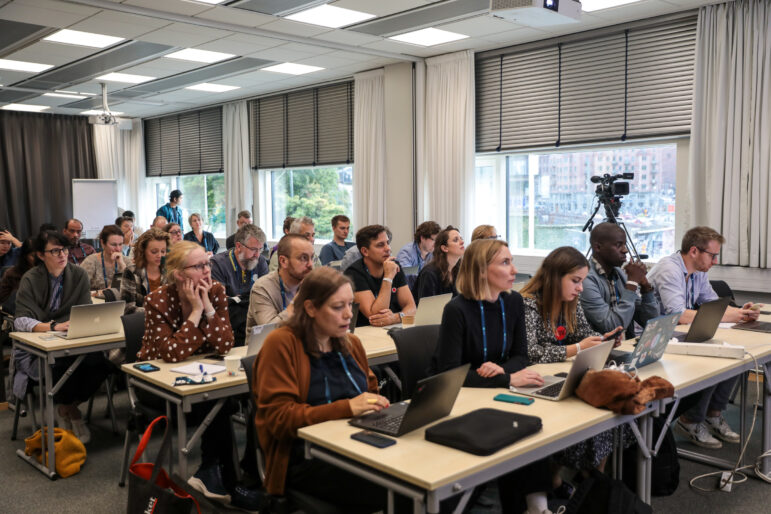

Image: Screenshot
Data Journalism Top 10: Secret Tax Files, India’s Faltering Vaccines, Western Drought, Argentina’s News Deserts, The Gambia’s Toxic Water
Read this article in
Some of the wealthiest people on the planet, including Jeff Bezos, Elon Musk, and Warren Buffett, have paid little to no US income taxes in recent years. Our NodeXL mapping from June 7 to 13, which tracks the most popular data journalism stories on Twitter each week, focused on this big story by ProPublica, which offers an unprecedented look inside the financial lives of US billionaires. In this edition, we also feature a detailed look at India’s faltering vaccination campaign, a data project exploring Argentina’s news deserts, and an investigation of The Gambia’s water paradox.
The Secret IRS Files
ProPublica reporters obtained a vast cache of Internal Revenue Service (IRS) data on the tax returns of thousands of the richest people in the United States, covering more than 15 years. The Secret IRS Files story quickly led to calls to rewrite the tax code and raised privacy concerns.
India: A Vaccine Campaign Falters
In January, India began efforts to vaccinate its population of 1.38 billion people against COVID-19. But the government’s multi-phase campaign has left some 600 million people aged 18 to 45 scrambling for shots. This project by Reuters Graphics goes through each stage of the campaign to explain how it faltered while a surge of infections in April and May created a national crisis.
Argentina’s News Deserts
A team of 20 journalists in Argentina produced a six-month investigation to measure the growing problem of local “news deserts” — communities lacking access to quality information such as daily newspapers. The ambitious data project mapped the uneven distribution of media and journalists across the country, highlighting large spaces thirsty for news coverage. According to the findings, news deserts and semi-deserts cover three-quarters of Argentina. Readers can explore the interactive map and find out more about the situation in their region.
Inside London’s Docklands
London’s docklands were once a derelict wasteland. But since the 1980s, this area of the British capital has been transformed with new residential buildings, office towers, and other ambitious infrastructure projects. Its boroughs have also had some of the fastest population growth. This visual piece by the Financial Times explains how the Docklands have been developed over the past four decades.
A Diminished Trump
Following the violent attack on the US Capitol building in January, Facebook and Twitter banned former president Donald Trump from using their platforms. An analysis by The New York Times shows that the ban has significantly diminished the reach of Trump’s statements. However, some of Trump’s utterances still manage to attract large audiences.
The Gambia’s Water Paradox
The Gambia, a small, ecologically rich West African country, has adequate water resources to supply its population of 2.45 million people. But a data project by the Center for Collaborative Investigative Journalism (CCIJ) reveals that a significant portion of citizens in the West African country don’t have access to quality water. According to CCIJ, more than 45% of The Gambia’s people rely on contaminated water sources.
Income Distribution in Italy
Want to know how income is distributed in Italian cities? New data from the country’s Ministry of Economy and Finance has prompted online daily Il Post to create a series of maps highlighting the territorial distribution of income. The data refers to the tax year 2019 and therefore shows the economic situation before the start of the global pandemic. Future reports would demonstrate the effects of the pandemic, especially on the difference in income between the center and the suburbs of large Italian cities like Rome, Milan, and Turin.
The Impact of Brexit
Six months after Brexit went into effect, researchers are trying to study the impact of the reintroduction of border checks between the UK and the European Union. The global pandemic and lockdown measures have made it more difficult to assess the consequences with regard to the British economy and trade with Europe. Still, an analysis by Voxeurop argues that the early signs are “not encouraging.”
Intense Western Drought
The Western United States — an area stretching from Colorado to California, and from Montana to New Mexico — is again being threatened by severe drought, with reservoir levels nearing record lows, according to a New York Times analysis of data from the US government. The newspaper notes that last winter’s mountain snowpack is already largely depleted. Making matters worse, say climate scientists: the hottest months of summer are still to come.
Hiding Behind Sources
Quantitative data is fundamental to contemporary news coverage. Outlets use a range of statistics to inform their reporting on the pandemic, elections, and other major events. In general, most reporters are expected to be able to adequately scrutinize numbers as part of their job. But in this piece for NiemanLab, Mark Coddington and Seth Lewis, former journalists turned academics, argue that this can create a potential problem. Research shows that normally skeptical reporters rarely question the numbers they receive, which may lead them to “reproduce the discourse around those numbers from their sources.”
https://twitter.com/pilhofer/status/1402385046305132551
Thanks again to Marc Smith and Harald Meier of Connected Action for gathering the links and graphing them. The Top Ten #ddj list is curated weekly.
 Peter Georgiev is GIJN’s social media and engagement editor. Previously, he was part of NBC News’ investigative unit in New York. He also worked as a correspondent for Bulgarian National Television and his reporting has been published by the Guardian, Deutsche Welle, and other international outlets.
Peter Georgiev is GIJN’s social media and engagement editor. Previously, he was part of NBC News’ investigative unit in New York. He also worked as a correspondent for Bulgarian National Television and his reporting has been published by the Guardian, Deutsche Welle, and other international outlets.









